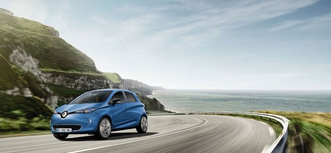
 By Ray Rivers
By Ray Rivers
August 23rd, 2020
BURLINGTON, ON
Did you know that Germans are now able to buy a brand new Renault electric vehicle (EV) for the cost of a cell phone contract?

Germany has gone further than most countries to promote the use of electric vehicles. The Renault can be had for the equivalent of a cell phone contract.
Yes, new EV subsidies there almost completely cover the cost of a new economy car, providing it’s of the plug-in variety. Europeans have always taken climate change seriously and are more prepared to take action than the rest of us – but even they are not doing nearly enough.
We, the people on this planet earth, keep breaking records on just how much climate warming pollution we generate.
2019 hit a new record, pumping 36.8 billion metric tons (gigatonnes) of carbon dioxide into the atmosphere. Thirty-six gigatonnes (Gt) ! It’s like we are in a competition to see how fast we can waste the planet.
To put that into context, if we took all the land mammals on the planet and put them on a scale they’d weigh one whole gigatonne. It is estimated that the entire human race together would weigh less than half a Gt. So that’s a lot of carbon pollution and it has led to a higher concentration in the atmosphere than at any point in at least the past 800,000 years.
The thermometer in Baghdad soared to 50 degrees C the other day. That’s 125 F, which is the ‘keep warm’ setting on my kitchen oven. And whether you measure it in Fahrenheit or Celsius America’s Death Valley won the title of hottest place on earth at 130 degree F (56 degrees C). And as you should expect, mother earth is responding to these carbon emissions even faster than anyone predicted.

One of the largest ice packs on the planet.
One of the largest ice packs on the planet, Greenland’s ice shelf, has passed the tipping point and is irreversibly melting faster than you can shake a stick. Combined with the rapidly increased melting of ice in the Antarctic, Canada and Russia, the US Geologic Survey, estimated that the world’s oceans could eventually rise 70 metres (230 feet) in a bunch of years. 70 metres is like 45 people standing one on top of each other.
The land below and adjacent to the ice caps is called permafrost, because it never used to thaw. Sealed in by frozen ground for millennia, since the last ice age, there are all kinds of treasures buried there, including some more very ancient viruses. There is also a lot of methane, the stuff you burn in your furnace. It’s from very old decayed vegetation.
It is estimated that there could be 1400 gigatonnes of carbon locked up as methane under the Arctic submarine permafrost alone. Methane is something like 32 times more powerful as a greenhouse gas than CO2. So if the scientists are right about potentially releasing those 1400 Gt of methane – do the math – we’re in for one helluva a party. And did I mention there is even more permafrost thawing on the land in northern Canada and Russia?
Further, scientists are now connecting global warming to a puzzling shift of the earth’s axis. Over the last 20 years there has been an increasing drift of the north pole away from Santa’s workshop in Canada’s north. That can be attributed to the melting of Greenland’s ice sheets. Greenland has been losing over 200 gigatonnes of ice a year since 2000 increasing the volumes in the oceans in the process. Meanwhile Antarctica has also lost over 90 gigatonnes.

Will the changing climate have an impact on the earth’s axis – and if it does what impact will a change in that axis have on the lives we live?
As the weight of the ice lifts off Greenland the poles start to migrate. It is uncertain what all this means for us planetary inhabitants, aside from our GPS devices needing some kind of updating, and poor Santa of course. But weather patterns will no doubt be heavily impacted as the rotation of the planet is affected.
So the impacts of warming the planet are not just about more flooding, more violent storms, more droughts and more massive forest fires, which in turn just add more carbon into the atmosphere.
COVID-19 might be the most immediate crisis before us now but global warming is the greatest existential threat we face. Yet we’ve all known about climate change for at least four decades and have failed to seriously respond to this growing crisis – a crisis which will be far more deadly than COVID-19.
An EV in every household Is a good start. And Germany is not the first jurisdiction to offer carrots instead of sticks to get their citizens to curb their carbon footprint. About half of the cars sold in Norway are fully electric, for example.
Ontario’s last government also offered generous EV subsidies. They started building a viable carbon-free electrical system, a viable carbon emission trading program and so much more. But we the voters clearly didn’t care about all that. Instead we voted in a government that clearly doesn’t get global warming, and has done it’s best to tear down all of those efforts.
Next time we’ll address why this is happening.
Meanwhile please join the discussion. As we said, perhaps too often, going into COVID – we’re all in this together as well.
 Ray Rivers, born in Ontario earned an economics degree at the University of Western Ontario and a Master’s degree in economics at the University of Ottawa. His 25 year stint with the federal government included time with Environment, Fisheries and Oceans, Agriculture and the Post office. Rivers is active in his community; he formed the first Sustainability Committee in Burlington.
Ray Rivers, born in Ontario earned an economics degree at the University of Western Ontario and a Master’s degree in economics at the University of Ottawa. His 25 year stint with the federal government included time with Environment, Fisheries and Oceans, Agriculture and the Post office. Rivers is active in his community; he formed the first Sustainability Committee in Burlington.
Background links:
Iraq Oven Temp – Hottest Temp Ever – 2019 Record
Canada Last Ice – Europeans – Free Car –
Greenland Ice – Earth’s Axis – Permafrost –



















What was the point of the silly diagram of the Earth, mislabelled and misleading? Garbage non-science at its best.
Eventually the depleted batteries could become a major problem.
I concur!
A very good comment. I hope you follow up with an explanation of where all the electricity will come from, how we will distribute it to our homes and what the cost will be. At the same time you can inform us what the government will do to make up the lost revenue from all the energy taxes from carbon based products that they currently collect..
I’m very glad you put each of the measures into a context we can all visualize and understand. Still, I am sadly convinced people just won’t internalize the message and act preventively; we are too stuck in the “I’ll deal with it when it happens” mentality.
Or we could have electric buses and encourage people to use transit. Ha-ha, no can do. We waste 1/3 of the land mass on parking lots in most suburbs. That’s mass of asphalt affects the climate as well.
How are you going to encourage people to use transit? An effective transportation option in Burlington must be convenient and time efficient–currently, for most residents, Burlington Transit is neither. I live almost due south of the Burlington Centre near Lakeshore Road–it currently takes me 5 minutes to drive there; by bus, almost 45 minutes. Want to know what choice I’m making?
Other choices:
– walk
– ride your bike
– ride share with a friendly neighbour:)
I agree. Transit in Burlington is neither fast nor efficient. Part of the problem of our city’s design. Which is also part of the appeal.
Yes, Ray, let’s give every Ontario family an EV (one of my former customers before I retired lives in a household where the major breadwinner earns over $400,000; she received a cheque from the former Wynne LIBERAL government for $15000 to buy a high end Tesla) but even if we do that, the Ontario grid can’t handle it. One engineer with considerable hydro experience stated earlier this year that if every city block in Ontario had ONE EV, brownouts would be commonplace.